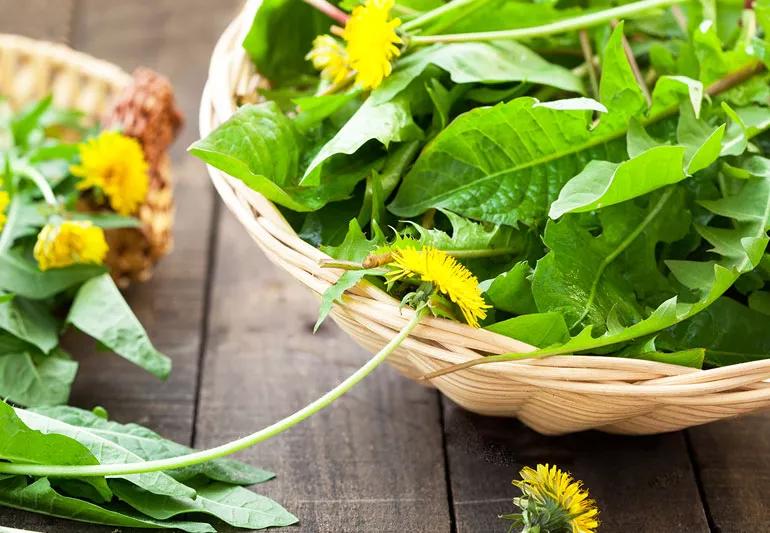Besides being chock-full of nutrients, dandelions contain compounds that may help prevent health problems

Dandelions pop up overnight to blemish a perfect green lawn and crowd out the petunias in your flower garden. But instead of going to war with the ubiquitous yellow weeds, you might want to welcome them into your kitchen.
Advertisement
Cleveland Clinic is a non-profit academic medical center. Advertising on our site helps support our mission. We do not endorse non-Cleveland Clinic products or services. Policy
“Dandelions are herbs, and herbs have many health and nutritional benefits,” says registered dietitian Nancy Geib, RD, LDN.
Why should you add them to your diet? Let us count the ways.
Dandelions pack a whole lot of vitamins and minerals into a small plant. “They’re probably the most nutritionally dense green you can eat — outstripping even kale or spinach,” Geib says.
Dandelion greens, in particular, are a great source of vitamins and minerals such as:
Besides being chock-full of nutrients, dandelions contain compounds that may help prevent health problems. Unfortunately, scientists don’t focus a lot of attention on wild herbs and plants. More research is needed to confirm everything dandelions can do, Geib notes.
“Still, some research points to several benefits of dandelion,” she says.
Dandelions contain several different types of antioxidants throughout the roots, leaves and flowers, Geib says. Antioxidants protect your body against free radicals — rogue molecules that can damage your body’s cells and make you age faster.
Chronic inflammation in the body plays a role in a long list of serious health problems, including cancer and heart disease. One way to stay healthy is by eating foods that fight inflammation. Add dandelion to your anti-inflammatory diet: Lab studies have found that compounds in these plants can dial down inflammation.
Advertisement
Dandelions are rich in potassium, which makes them a natural diuretic. In other words, they make you pee. Diuretics are often used to help control high blood pressure.
Dandelion has been used around the world as a natural way to control Type 2 diabetes. Researchers are still investigating that link, but studies in animals suggest that the compounds in dandelions might help reduce blood sugar levels in people with diabetes.
Lowering cholesterol is a key step to reducing the risk of heart disease. Studies in animals have found that extracts from dandelion roots and leaves can naturally lower cholesterol levels.
“The great thing about the dandelion is that every part of the plant is edible,” says Geib. She shares her tips for preparing this free-range herb:
Can you get the goodness of dandelion from supplements and extracts? Possibly, though the science isn’t clear, Geib says. And since there is not a lot of research on dandelion supplements, there aren’t clear dosage guidelines.
Most foods pack the biggest nutritional punch if you eat them fresh — and dandelion is probably no exception, she adds. But if you’re not a fan of their flavor (or the plants are out of season), talk to your doctor about whether dandelion supplements might be beneficial.
Make sure to chat with your healthcare provider if you take certain medications. Dandelion supplements may interact with some drugs, including:
Dandelions have a lot going for them, but there are some things to know before serving them for dinner. You can pick the blossoms right from your yard, “but — if you’re harvesting wild dandelions — make sure you’re picking them from an area you know hasn’t been treated with pesticides or other chemicals,” Geib cautions.
You don’t need to eat them every day to reap the benefits (though you could if that’s your jam). Geib suggests approaching them like any other herb and adding them into the rotation as part of a varied and colorful diet.
Advertisement
“Dandelions are really wonderful for their nutrition and medicinal value,” Geib says. “Don’t be afraid to try something out of the box.”
Advertisement
Learn more about our editorial process.
Advertisement

With a focus on internal cues for hunger and fullness, this eating style may revolutionize your relationship with food

Review the ingredients, watch for sugar and fat, and choose one with the right amount of protein for your needs

Getting the hang of portions can help you better understand how much to put on your plate

A typical recommended balanced diet is half fruits and veggies, a quarter protein and a quarter grains

Foods high in protein, fiber and water can help keep hunger at bay

This quirky food trend is harmless, as long as you’re getting enough protein, fiber and healthy fats

Learning about your relationship with food can help improve your eating behaviors and patterns

Eating mindfully, sipping water and chewing slowly can help your brain catch up with your stomach

Wearing a scarf, adjusting your outdoor activities and following your asthma treatment plan can help limit breathing problems

Your diet in the weeks, days and hours ahead of your race can power you to the finish line

When someone guilt trips you, they’re using emotionally manipulative behavior to try to get you to act a certain way